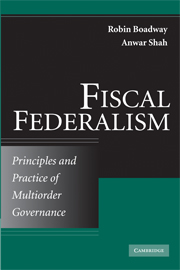Book contents
- Frontmatter
- Contents
- Preface
- PART ONE DESIGNING FISCAL CONSTITUTIONS
- PART TWO REVENUE SHARING AND FISCAL TRANSFERS
- PART THREE FINANCE AND PROVISION OF PUBLIC SERVICES
- PART FOUR CHALLENGES AND RESPONSES
- 14 Fiscal Federalism and Macroeconomic Governance
- 15 Interregional Competition and Policies for Regional Cohesion and Convergence
- 16 Decentralized Governance and Corruption
- 17 Adapting to a Changing World
- References
- Index
14 - Fiscal Federalism and Macroeconomic Governance
Published online by Cambridge University Press: 05 June 2012
- Frontmatter
- Contents
- Preface
- PART ONE DESIGNING FISCAL CONSTITUTIONS
- PART TWO REVENUE SHARING AND FISCAL TRANSFERS
- PART THREE FINANCE AND PROVISION OF PUBLIC SERVICES
- PART FOUR CHALLENGES AND RESPONSES
- 14 Fiscal Federalism and Macroeconomic Governance
- 15 Interregional Competition and Policies for Regional Cohesion and Convergence
- 16 Decentralized Governance and Corruption
- 17 Adapting to a Changing World
- References
- Index
Summary
Large and growing numbers of countries around the globe are reexamining the roles of various orders of government and their partnerships with the private sector and the civil society with a view to creating governments that work and serve their people (see Shah, 1998c, and Shah and Thompson, 2004, for motivations for a change). This rethinking has led to a resurgence of interest in fiscal federalism principles and practices, because federal systems are seen to provide safeguards against the threat of both centralized exploitation and decentralized opportunistic behavior, while bringing decision making closer to the people. In fact, federalism represents either the “coming together” or “holding together” of constituent geographic units to take advantage of the greatness and littleness of nations, because in a flat (globalized) world nation-states are observed to be “too small to tackle large things in life and too large to address small things” (Bell, 1987: 13–14). However, federal fiscal systems to accommodate “coming together” or “holding together,” according to some influential writers, pose a threat to macroeconomic stability. They argue that decentralized governance structure is incompatible with prudent fiscal management and even regional fiscal equity (see, e.g., Prud'homme, 1995; Tanzi, 1996). This chapter investigates the conceptual and empirical bases of these arguments. More specifically, the chapter addresses the following questions:
Are there greater risks of macroeconomic mismanagement and instability with decentralized fiscal systems (federal vs. unitary countries)?
What has been the experience to-date in macroeconomic management in federal versus unitary countries? Or what has been the impact of decentralization on fiscal discipline and macroeconomic stability?
- Type
- Chapter
- Information
- Fiscal FederalismPrinciples and Practice of Multiorder Governance, pp. 464 - 497Publisher: Cambridge University PressPrint publication year: 2009

